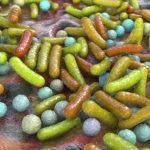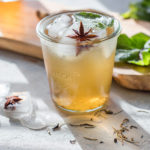February 03, 2012
By David Blyweiss, M.D.
In This Issue:
- The five pounds in your gut you should preserve, protect and even replace
- How to reclaim the gut flora that is your birthright
- Why you should kick the antacid habit while you’re at it
Here’s a humbling fact to consider…
There is more bacterial DNA than human DNA in your body. In fact, 90% of cells in the human body are microbial… and a mere 10% are “human.”
So, are we bacteria having a human experience? It’s seems quite possible. Though perhaps not how we like to see ourselves. One thing is certain though, we should treat our microscopic cohabitants with a measure of respect for all they do for us. Our health would be seriously compromised without the 3-5 pounds of bacteria living in our gut.
When researchers raised mice in a completely sterile environment, and kept them from developing any gut bacteria whatsoever, the mice didn’t develop an immune system. When they were colonized with gut flora, their immune systems developed.
When we look at the near-epidemic proportions of autoimmune disorders facing us today, it’s easy to see why you might want to fight to keep that five pounds, even if you are working to shed the rest…
We may be years away from understanding the big picture of our relationship with our gut flora. Studies are underway now that examine the connection between our loss of flora to a host of health challenges, such as celiac disease and wheat sensitivity, immune system malfunction, allergies, chronic autoimmune disorders, and even cancer.
Open your arteries, improve blood flow for a new health miracle...
Did you know your circulatory system has over 60,000 miles of arteries, veins and other blood vessels, if stretched end to end?
But as you age, your blood vessels undergo changes, which may cause them to stiffen, thicken and get clogged.
GOOD NEWS! Doctors have now identified a “Miracle Molecule” inside your arteries that helps OPEN your arteries and IMPROVE blood flow.
It’s what Dr. Valentin Fuster calls it, "One of the most important discoveries in the history of cardiovascular medicine."To you, that means...
- Healthy blood pressure
- Sharper mind and memory
- Skyrocketing energy and muscular strength
- Increased pleasure and passion in the bedroom
- Improved circulation to every cell and organ in your body
Go here to discover a new natural way to significantly boost the levels of this miracle molecule in YOUR body NOW!
This research is complicated even further by the fact that these flora can’t survive outside of our gut long enough to even make it onto a slide and under a microscope. So it could be years – longer than some of us want to wait – until we have all the answers.
But what we know so far is chilling.
Every time you injure the bacteria in your gut, it’s a struggle to get it back. The first round of antibiotics you take can wipe out what you got from your mother as a baby. You can get it back… once. But a second round of antibiotics – especially if it’s within six months of the first – can wipe it out again, for good this time.
When you consider the rampant use of antibiotics in the past few decades – from pediatrics to geriatrics and every age in between – you get an idea of the enormity of this problem.
The other bacteria killer is stress. An adrenaline release can kill bacteria. Chronic stress can wipe out your entire colony. To make matters worse, you become a sitting duck for “bad” microbiota to replace the “good” bacteria, such as candida, h. pylori, the bad e-coli, salmonella and more.
It’s quite a mess…
Rampant overuse of antibiotics has been a hallmark of medical practice for the last 30 or more years. Chronic stress is more a part of our lives than ever before. And sugar, which feeds the “bad” bugs in our gut, is more present in our diets than at any other time in history.
To our bacteria, it must feel like all-out war. A war they are losing.
I strongly recommend you take probiotic supplements every day. You can refer back to some earlier articles for more detail on what to take, and what to look for on the labels using the links at the bottom of this issue.
The World's Quickest Solution for Ending Prostate and Urinary Misery
This has recently been revealed to be one of the only real breakthroughs in prostate health.
The seeds of a strange fruit (sometimes called "Chinese Apples") hold powerful phytonutrients that are a revolution in prostate health.
In fact, UCLA and Veterans Administration research have now proved this to be true.
Not only that, but it may be the worlds quickest solution for ending prostate misery.
Simply stated, these phytonutrients represent a huge step beyond beta sitosterol, saw palmetto, and other phytosterols alone.
Simply click HERE if you want to have fast prostate relief...restful, uninterrupted sleep...no more constant "urges to go"...enhanced virility...and optimal prostate support for life.
As probiotic awareness grows, so does the marketing machine to sell you on foods that contain probiotic benefits. Buyer beware! There is rarely enough probiotic activity in even raw and unfermented foods to make do without taking a probiotic supplement.
So, if you’re thinking – I eat yogurt every day, so I’m covered – think again. You would have to eat 35 containers of yogurt every day to get enough live bacteria. Plus, if you eat yogurt with any sugar or high-fructose corn syrup, the sugar content outweighs the bacterial benefit anyway.
Speaking of sugar… this is another important piece of the bacterial puzzle.
Sugar feeds yeast – more specifically, the common forms of sugar found in most foods, such as cane sugar and high fructose corn syrup feeds “bad” yeast such as candida… but does nothing to improve the beneficial bacteria in your gut.
Prebiotics, on the other hand, contain forms of sugar that feeds the bacteria you want to grow and flourish. Two examples of prebiotics are oligofructose and inulin; both of these substances act in the large intestine to promote the growth and activity of bifidobacteria.
Many probiotic supplements contain prebiotics, as well. You can also include foods in your diet that will feed and help re-populate your gut flora, such as:
- Raw chicory root
- Raw Jerusalem artichoke
- Raw dandelion greens
- Raw garlic
- Raw leek
- Raw onion
- Cooked onion
- Asparagus
- Raw banana
These items will have some benefit still after they are cooked, but are most beneficial when raw.
Supplementing with probiotics is absolutely essential for anyone who has had more than 2 rounds of antibiotics in your lifetime, has a compromised immune system, suffers with autoimmune disease, or lives with chronic stress.
And it’s not a bad idea for the rest of us, either.
And if you do need to take a round of antibiotics – and you and your doctor agree there is no other way to fight whatever bacterial infection you might have without them – realize you will have to work much harder, before, during and after you are treated, to get your gut flora back.
One last piece of your digestive puzzle
Plop, plop, fizz, fizz… oh, what a relief it is…
This commercial alone generated millions of dollars in antacid sales… and it also helped promote what I consider one of the greatest campaigns of misinformation in our health history: excess stomach acid as the cause of indigestion.
The truth is that low stomach acid is more likely to cause the symptoms of indigestion. Symptoms of low stomach acid, also known as hypochlorhydria, include: bloating, belching, flatulence immediately after meals, heartburn, indigestion, diarrhea or constipation…
Sound familiar?
Stomach acid or hydrochloric acid (HCl), is a very powerful digestive agent. It is responsible for some of the most important functions in your body:
- Breaks down proteins into essential amino acids and nutrients so your body can absorb them.
- Stimulates your pancreas and small intestines to produce the digestive enzymes and bile necessary to further breakdown the carbohydrates, proteins and fats you eat.
- Prevents disease by killing pathogenic bacteria and yeast normally present in food, before it can travel through the intestines and reach the colon.
We naturally produce less stomach acid as we age, not more. So by taking antacids, you are making the problem worse… not better.
Fortunately, many of the same remedies for restoring your gut flora can also help increase your stomach acid. You just have to do your part by not taking antacids, reducing or eliminating sugar in your diet, and enjoying some peppermint or ginger tea every day.
There’s one particular tip I use personally when I’m out to dinner in a restaurant that has a bar. I enjoy a little concoction of Angostura bitters, a few limes and seltzer water. Bitter herbs are a traditional remedy for indigestion that has stood the test of time, and is one of the easier daily practices you can do to improve your digestion at every meal.
Resources:
Saavedra, J.M. and Tschernia, A., Human Studies With Probiotics and Prebiotics: Clinical Implications, British Journal of Nutrition, Volume 87, Supplement s2, 1 May 2002, pp. 241-246(6).
Kennedy M.D., Ron, Hypochlorhydria. Doctor’s Medical Library
http://www.med-library.net/content/view/177/41/





